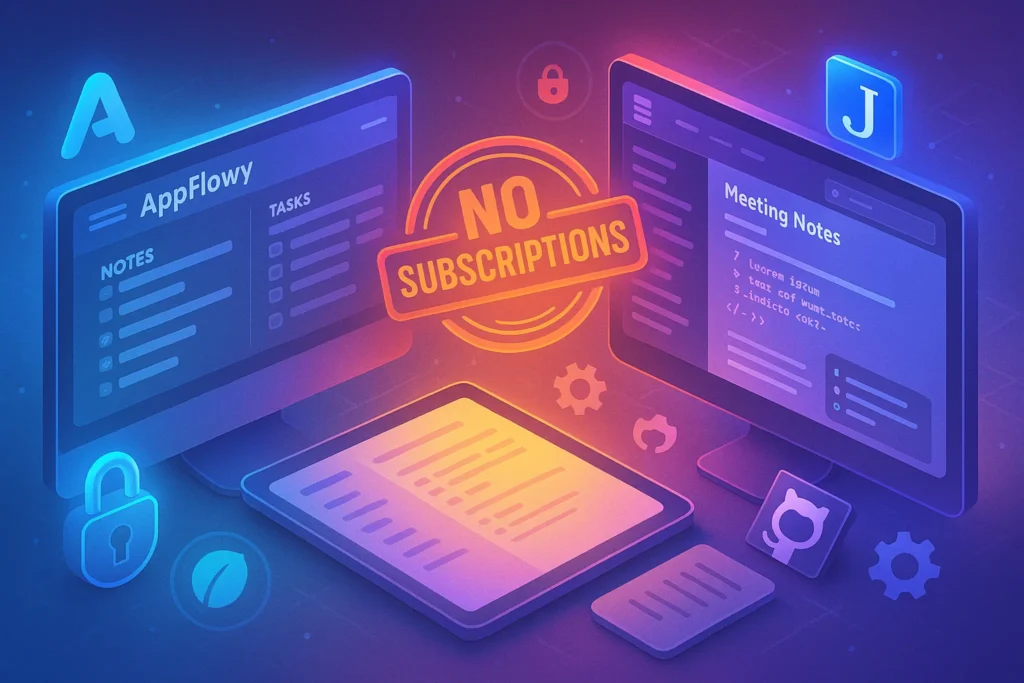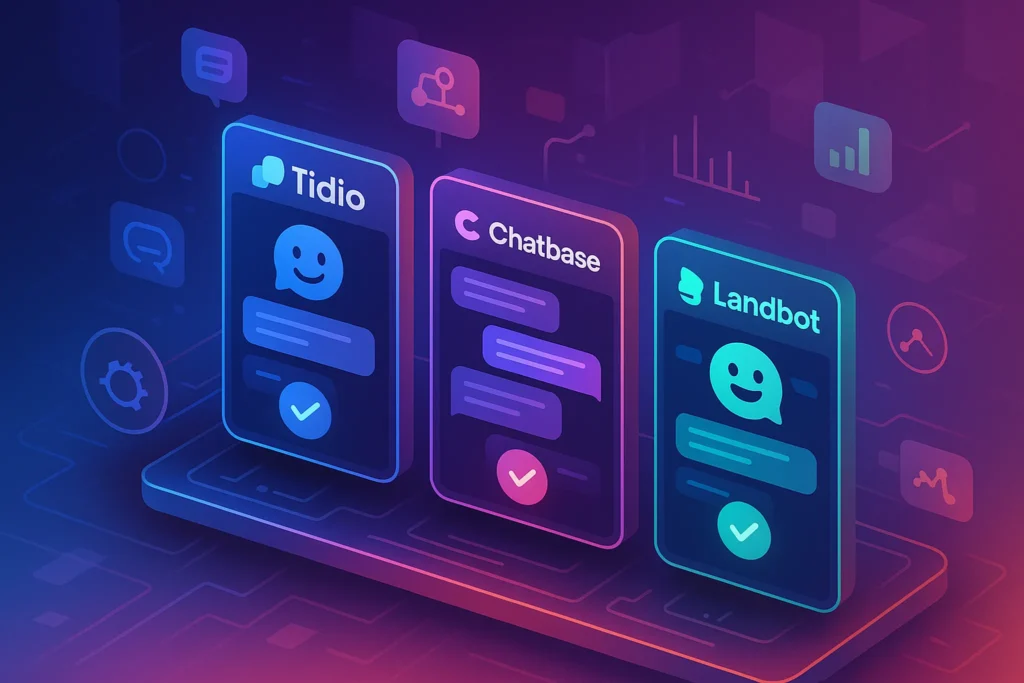-This post may contain affiliate links. If you click on one and make a purchase, I may earn a small commission at no extra cost to you.-
🧭 Introduction
In a world where SaaS subscriptions quietly eat at your budget, open-source alternatives shine by offering privacy, full control, and zero recurring costs. For freelancers, small teams, or anyone valuing digital independence, these tools empower you to host data yourself, inspect the code, and customize features on your own terms.
Ready to replace subscription‑based services with free, community‑driven productivity tools that work just as well? They align perfectly with principles from How to Organize Your Digital Life, and actionable tips in Productivity Hacks, helping you simplify and own your workflow without clutter.. Let’s explore the categories—and apps—that deserve your attention.
🛠️ Best Open Source Alternatives by Category
✍️ Note-Taking & Knowledge Management
AppFlowy
This Notion‑style alternative is built on Rust and Flutter, offering modular blocks, templates, and real-time collaboration on your own server. Unlike Notion, where your content lives in a black box, AppFlowy gives you full control—ideal for privacy-minded creators seeking flexibility and ownership.
A beautiful, self-hostable Notion clone built on Rust & Flutter. Features include block-based editing, nested pages, templates, and a plugin ecosystem.
Why try it: If you love Notion’s flexibility but want full data ownership, AppFlowy lets you run your own server or cloud.
Imagine a bullet journal with drag‑and‑drop blocks, templates for goals or meeting notes, and full control—hosted on your own server. AppFlowy delivers this with a clean interface inspired by Notion, powered by Rust’s speed and Flutter’s design. Teams can share project roadmaps or client specs privately while customizing the UI or adding plugins—without vendor lock‑in.
Logseq
A Markdown-first, local‑first knowledge vault, Logseq supports bidirectional linking, journaling, and synchronization via Git or cloud storage. The tool encourages a Zettelkasten-style thinking process, helping you connect ideas over time—perfect for researchers, writers, and lifelong learners.
Markdown-first knowledge base with bidirectional linking and daily journal support. Sync via Git, Nextcloud, or your own file server.
Why try it: Ideal for users who love Zettelkasten-style note networks and plain-text longevity.
Picture a personal Zettelkasten, mental garden, or efficient daily journal you can publish or export at will. Logseq lives locally, supports plaintext Markdown and outlines, and syncs via Git or Nextcloud. It assists both deep thinking and daily task capture—making your digital notes both networked and evergreen.
Anytype
A modern, graph-based knowledge base with offline access and end-to-end sync. It combines note-taking, task management, and collaboration—without relying on servers. If you’re building your Second Brain but want data autonomy, Anytype offers structured freedom in one elegant package.
A privacy-first local-first tool combining blocks, tasks, and decentralized syncing. Works across desktop and mobile.
Why try it: Initialize and manage second-brain setups without reliance on proprietary sync services.
Think Notion plus a built-in task manager, but private by default—even without cloud. Data lives first on your device and then syncs peer-to-peer. You can customize templates, link objects, and collaborate via shared workspaces—all with native mobile apps and without recurring fees.
📅 Task Management & Kanban
Wekan
Deployable via Docker or Snap, Wekan recreates Kanban boards like Trello but with self-hosted independence. It supports swimlanes, labels, checklists, and due dates—making it an ideal substitute for teams wanting visual pipelines without vendor lock-in.
A self-hosted Trello alternative with board, card, swimlane, and checklist support. Deploys via Docker or Snap.
Why try it: For teams that want visual Agile workflows without paying per-user fees.
If your team loves Trello’s simplicity but you want independence, Wekan delivers. Create boards in minutes, add tasks, drag cards, set swimmies and due dates. Share with teammates securely, and add features like LDAP integration or custom theming. No subscriptions, no per-member limits—just visual freedom.
Planka
With a clean React-based interface, Planka brings polished UX to open-source Kanban boards. It supports team permissions, real-time collaboration, and notification features. Teams that enjoy Trello’s design, but want to self-host, will find Planka produces a smooth transition.
Another open Kanban board tool, built with React. Lightweight and modern interface, with team permissions and notifications.
Why try it: Great for creative teams looking for a polished, intuitive board platform.
With its modern UI and React base, Planka feels like a polished Trello clone. It adds real-time collaboration, customizable notifications, and permissions. Whether managing content calendars or product development sprints, Planka offers visual clarity in a hostable package.
📝 Documents & Collaboration
CryptPad
An encrypted, zero-knowledge collaboration platform for writing documents, spreadsheets, and polls. All content is encrypted on your device—CryptPad servers never see your data. This makes it an excellent substitute for Google Docs when privacy and confidentiality matter most.
Privacy-first collaboration suite offering text documents, spreadsheets, polls, kanban boards—all encrypted client-side.
Why try it: Share notes or collaborate on spreadsheets without the provider ever seeing your content.
If you value privacy, CryptPad encrypts everything before it leaves your browser. Collaborate on documents, polls, spreadsheets, and even kanban boards—knowing no one else ever sees your content. Great for sensitive info like meeting notes, HR docs, or financial worksheets.
OnlyOffice / LibreOffice Online
These offer powerful in-browser editing of Microsoft-compatible documents. They include document collaboration, commenting, and review workflows. Paired with Nextcloud or similar, they create a full-featured, subscription-free office suite ideal for teams managing reports or formal documents.
Open-source Office suites that support rich document and spreadsheet editing in the browser. Integrates with Nextcloud.
Why try it: Built-in MS-format compatibility, ideal for document-heavy teams wanting SaaS-free editing.
Want rich, familiar editing without Microsoft 365 fees? These suites offer near-native document fidelity inside your browser, with comments, tracked changes, and real-time editing. Pair with Nextcloud for enterprise-ready document workflows—no subscriptions required.
💬 Messaging & Communication
Mattermost
This Slack-style team chat platform offers threads, file sharing, integrations, and strong self-hosted options. With granular permissioning and compliance features, Mattermost suits teams prioritizing internal control and brand‑safe communication.
Secure team chat platform with channels, threads, file sharing, and self-hosted deployment. Compliant and extensible via plugins.
Why try it: A privacy-first Slack replacement you can host on your own infrastructure.
If privacy matters, host your own Slack-style chat. Mattermost supports threaded channels, emojis, file attachments, and integrations—but your data lives in your cloud or server. Whether you’re building a remote small team or open-source community, Mattermost offers speed and safety.
Zulip
Zulip blends real-time chat with email-like threading. Its topic-based conversations prevent cross-talk, helping small and large teams stay focused. A self-hostable, structured chat option, it’s particularly helpful when discussions need clarity and organization.
A threaded-chat app combining email-style threading and instant messaging. Supports self-hosting with rich integrations.
Why try it: Great for keeping conversations organized across multiple topics.
Picture Slack, but with email‑style threading so important topics don’t get buried. Zulip’s structured conversations make it ideal for support teams, open source communities, or multi-project environments—keeping each chat on topic without losing context.
📞 Video Conferencing & Calls
Jitsi Meet
An open-source video conferencing tool that runs entirely in your browser—no downloads needed. It supports breakout rooms, screen sharing, and secure audio/video. If Zoom isn’t your preference, Jitsi offers a seamless, free, and private alternative.
Fully encrypted, browser-based video conferencing—no account needed. Supports screen sharing and breakout rooms.
Why try it: Ideal for private meetings without relying on corporate platforms.
Want a Zoom-like experience, but without a login or downloads? Jitsi Meet runs entirely in your browser with full encryption, screen share, captions, and breakouts. Host client calls or onboarding sessions in seconds—no accounts, no fees, no worries.
BigBlueButton
Designed for education and webinars, this platform offers polling, interactive whiteboarding, and recording capabilities. Ideal for workshops, training sessions, or collaborative learning, BigBlueButton competes with paid e-learning platforms without requiring subscription fees.
Designed for online learning and webinars, with polling, breakout rooms, whiteboards, and recording features.
Why try it: A full-service alternative for workshops and remote teaching without licensing fees.
Zoom-lite built for educators: whiteboarding, polling, recordings, and breakout rooms. Host live workshops or client trainings—with unlimited usage, responsive layout, and total content ownership.
✅ Task Helpers & To-Do Lists
Joplin
Combining note-taking and to-do lists, Joplin offers end-to-end encryption and local-first syncing with familiar cloud services. It’s a powerful, privacy-preserving Evernote alternative that keeps your tasks and notes unified, organized, and secure.
A secure note-taking app with to-do support, end-to-end encryption, and synchronization via Dropbox, Nextcloud—even file systems.
Why try it: A combined note/task solution for those who loved Evernote but want encryption and offline control.
Combine note‑taking and task management with end-to-end encryption. Joplin handles notebooks, tags, and to‑do lists—and syncs via familiar services like Dropbox. Use it daily to capture ideas, tasks, or meeting notes—then check them off as you go.
Vikunja
A self‑hosted to‑do list app featuring tasks, lists, reminders, and labels—plus team sharing. If you’re replacing Todoist or Wunderlist, Vikunja handles lightweight project and task tracking without subscription costs.
A self-hosted, open-source to-do/task manager with lists, due dates, labels, reminders, and collaboration.
Why try it: Modern UI with shared lists and scheduling—ideal for light project management.
A modern take on list-based productivity. Create personal or team lists, share them, set reminders, and use labels. For small teams, Vikunja supports task assignments and due dates—lightweight and transparent.
Tasks.org
A truly mobile-centric app for Android, with ICS and calendar support. It syncs tasks with CalDAV servers like Nextcloud and follows Material design. If your task flow lives on your phone, Tasks.org ensures your schedule is free and flexible.
A mobile-first, calendar-integrated task app for Android with support for ICS syncing and Material design.
Why try it: Use if most of your workflow happens on mobile and you want calendar integration without proprietary apps.
Ideal for mobile-first users on Android: this app syncs with CalDAV, integrates with your existing calendar, supports recurring tasks, reminders, and even Location-based triggers. Solid choice if your productivity lives in your pocket.
🌐 Where & How to Get These Tools
Each project offers different installation methods—self-hosted via Docker, via Nextcloud plugin, or as desktop/mobile apps. You can find the latest downloads and setup instructions on their official GitHub pages or websites. Choose a hosting method based on your comfort: local Docker, a VPS, or even your NAS.
🔄 How These Tools Reward You
-
Privacy & Control: Your data isn’t rent—it’s yours
-
No vendor lock-in: Export to Markdown or ICS anytime
-
Budget-friendliness: One-time hosting vs monthly subscriptions
-
Community-driven: Regular enhancements, peer support, open feedback loops
This setup echoes the ethos behind Productivity Hacks—clean, essential, and empowering.
🧠 Nerd Verdict
Open-source productivity tools offer power, privacy, and freedom—no subscriptions required. Yes, self-hosting requires a bit of technical effort, but the trade-off is full control over your data and hygiene. Whether you choose AppFlowy for second-brain notes, Wekan for boards, or Joplin for encrypted to-dos, each tool lays the foundation for a lean, effective stack. You’ll work smarter—and cheaper.
Swapping paid tools for open-source alternatives isn’t about compromise—it’s about sovereignty. For any task, there’s a community-made option that works beautifully: AppFlowy, Logseq, Wekan, Mattermost, Jitsi—they’re fast, secure, and cost-free. You’re trading subscriptions for independence—and a richer digital life in return.
❓ FAQ
Q: What’s the risk of self-hosting?
A: Just like any system, ensure you back up data, apply updates regularly, and use SSL. Prefer containers (like Docker) to simplify upgrades.
Q: Are these tools as stable as paid services?
A: Many are production-ready and community-supported. You may miss some “premium polish,” but updates are steady and reliable.
Q: Can I mix open-source with paid tools in my stack?
A: Absolutely. For example, use Mattermost for chat and Joplin for notes, while still keeping Slack for clients.
Q: How do I back up my open‑source data?
A: Use built‑in export features or schedule automated backups (via Docker or script). Tools like Joplin or Logseq export to Markdown, ensuring portability.
Q: Can I mix paid and open-source tools in the same environment?
A: Absolutely. Use self-hosted tools for internal needs and paid SaaS for client-facing parts or specific integrations—hybrid stacks work well.
Q: Are open-source tools production-ready?
A: Many are—just check GitHub for frequency of commits and community size. Projects like Joplin, AppFlowy, Wekan are widely used and actively maintained.
💬 Would You Bite?
Have you tried replacing any of your productivity tools with open-source alternatives?
Which one would you consider switching to first—and why?
Drop your thoughts in the comments—we’d love to hear what’s in your stack!👇



